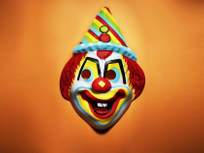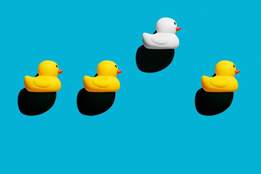You know what it looks like… but what is it called?
TAKE THE QUIZTrending: ‘camp’
Lookups spiked 5,800% on May 6, 2019
Camp, or at least one sense of the word, had a decided moment in the spotlight on May 6th, 2019, due to the word featuring prominently in the title of the newly-opened fashion exhibit at the Metropolitan Museum of Art (and its subsequent gala event).
“Camp: Notes on Fashion” derives its name from Susan Sontag’s 1964 essay “Notes on Camp,” which unfolds in list form because “jottings … seemed more appropriate for getting down something of this particular fugitive sensibility.”
The Sontagian sense of camp referenced by the Met is one that we define as either “a style or mode of personal or creative expression that is absurdly exaggerated and often fuses elements of high and popular culture” or “something so outrageously artificial, affected, inappropriate, or out-of-date as to be considered amusing.” However, the earliest meaning of this form of camp (which is lexically distinct from the ‘uncomfortable sleeping outdoors with twigs and such’) has more sexualized overtones, defined as “exaggerated effeminate mannerisms (as of speech or gesture).”
Our earliest written record of camp in any of the above senses comes in 1909, in James Redding Ware’s Passing English of the Victorian Era. Ware defined the word as “Actions and gestures of exaggerated emphasis,” offered a snide editorial aside (“Probably from the French. Used chiefly by persons of exceptional want of character”), and a short exemplary citation (“How very camp he is”).
Despite Ware’s assertion that camp comes from the French we really have very little knowledge of its origins. One possible precursor to camp is the word campish, which appeared in trial in the middle of the 19th century. Frederick William Park, a London man who in 1858 was being prosecuted for dressing in women’s clothing and soliciting physical intimacy wrote a letter in which he referred to his “campish undertakings”; the letter was introduced at trial and caused some stir (and is part of the exhibit at the Met). We do not know if campish led to camp, or where either one of these words came from, but we do know that this use of camp came well before Sontag.
Although tightly written, A.J. Kronengold’s lack of plot, use of Playboyish-type gay symbols instead of characters, and single-level dialogue categorizes the play as high camp instead of true dramatic art.
— Jae, The Gay Blade (Washington, DC), Mar. 1974
Trend Watch is a data-driven report on words people are looking up at much higher search rates than normal. While most trends can be traced back to the news or popular culture, our focus is on the lookup data rather than the events themselves.








